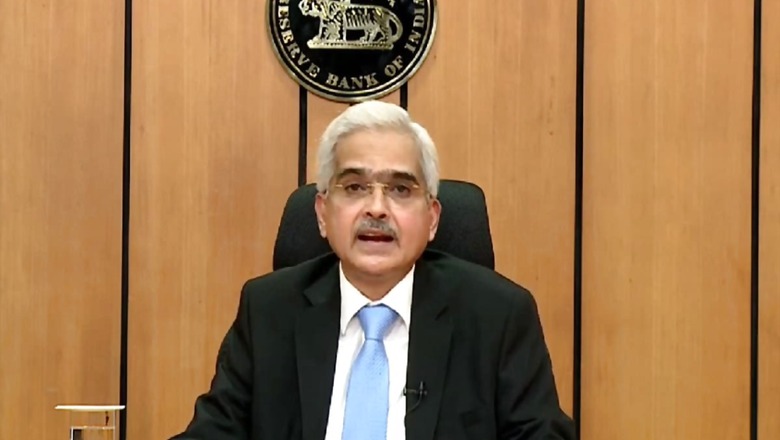
views
The uncertainty created by the jump in Covid-19 infections and localised lockdowns prompted RBI Governor Shaktikanta Das and other members of the rating setting panel MPC to unanimously vote for status quo in interest rates and an accommodative policy stance to support growth, as per minutes of the meeting released on Thursday. “The need of the hour is to effectively secure the economic recovery underway so that it becomes broad-based and durable,” the Governor said during the three-day meeting of the Monetary Policy Committee (MPC) which ended on April 7.
The renewed jump in COVID-19 infections in several parts of the country and the associated localised and regional lockdowns add uncertainty to the growth outlook, he observed, as per the minutes of the meeting released by the central bank. “In such an environment, monetary policy should remain accommodative to support, nurture and consolidate the recovery. We need to continue to sustain the impulses of growth in the new financial year 2021-22,” Das argued.
The MPC, consisting of Das, Michael Debabrata Patra (RBI Deputy Governor), Mridul K Saggar (RBI Executive Director) and three external members — Shashanka Bhide, Ashima Goyal and Jayanth R Varma — had voted in favour of retaining the repo rate unchanged at 4 per cent. Patra said monetary policy has to remain supportive of the economy until the recovery is more sure footed and its sustainability assured. He noted that longer term inflation expectations remain broadly stable in spite of high volatility in food and fuel prices.
“Demand pull is still weak,” he said, adding he would continue to look through the recent elevation in inflation and remain focused on reviving the economy on a path of strong and sustainable growth. “An integral part of this approach would be to insulate domestic financial markets from global spillovers and volatility so that congenial financial conditions continue to support growth,” he opined.
Mridul K Saggar said it was equally important to understand that while increasing fiscal space to the extent possible is desirable, any revision in fiscal targets should be consistent with medium-term debt sustainability and should not impinge on conduct of monetary policy, such as requiring direct monetisation that has been eschewed even by countries with low inflation.
According to him, the current account deficit in small size as expected is least of a worry, but going forward, with wide fiscal gaps, large twin deficits must be avoided over the medium term. “While we had moved towards calibrated exit from extra-ordinary supportive measures to mitigate the impact of Covid-19 as the curve was flattening, we have already made considerable adjustments in exit dates for these measures.
“The extant priority is now to continue supporting growth from the possible shock from the second wave,” he said, while voiting for retaining the policy rate and continue with the accommodative stance. Quoting Marie Curie, he said, “Nothing in life is to be feared, it is only to be understood. Now is the time to understand more, so that we may fear less.”
Jayanth R Varma said the economic recovery after the pandemic shock of 2020 remains uneven and incomplete, and the renewed jump in COVID-19 infections in certain parts of the country has increased the downside risk to the growth momentum. On the other hand, inflation rates have been consistently well above the mid point of the target zone and is forecast to remain elevated for some time.
“This is a difficult situation, but I believe that the balance of risk and reward is in favour of monetary accommodation,” he said.
As per the minutes, Ashima Goyal said India’s cautious approach to capital account convertibility means that volatile fixed income flows are still capped at 6 per cent of outstanding stocks of G-Secs. Large foreign exchange (FX) reserves, acquired during surges in inflows, are sufficient to counter outflows due to rising US G-Sec rates without having to raise domestic rates, Goyal said, and added sale of FX stocks will release space on the RBI’s balance sheet to buy more Indian government securities consistent with its target for creation of durable liquidity.
Shashanka Bhide said expansion of supply of goods and services in public and private spheres will require new investments and access to funds. The monetary policy environment so far has provided support to sustaining economic activities and recovery of growth, Bhide said, while adding that such policy environment is needed to strengthen and broaden the ongoing recovery process. The next meeting of the MPC is scheduled during June 2 to 4, 2021.
Read all the Latest News, Breaking News and Coronavirus News here. Follow us on Facebook, Twitter and Telegram.




















Comments
0 comment